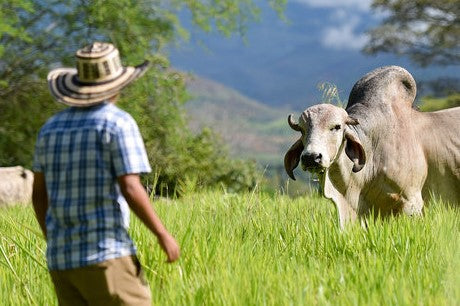
Is Eating Meat Bad for the Environment? Part 1: Introduction to Claims

We have all heard that eating meat is bad for the environment and that we should eliminate it from our diets.
Why is this perception out there, and is it true? I wanted to answer it for myself as well as share this with other folks. I wanted to get information from sources that had nothing to do with a particular diet or bent on agricultural business so as to not skew the results.
Being raised by a dad who grew up poor and with a mom who grew up in war-torn Austria, I have always had a keen awareness of not wasting things and feel we have a responsibility to be careful about how we use our resources.
I have spent a big portion of my career on various environmental projects for the energy industry in the form of solar energy as well as pollution reduction from fossil fuels. So, when people mention greenhouse gasses associated with animal agriculture, it peaks my interest.
Let’s start by looking at the top three claims about the negative impacts of raising beef. I will dive deeper into each of these concerns in separate blogs in the coming weeks:
-
Cattle generate methane, which is a greenhouse gas and therefore negatively contributes to global climate change.
-
A large amount of agricultural land is used for feeding cows, and this is contributing to the loss of rainforest at an alarming rate.
- The waste products produced from raising cows is detrimental to the environment both as an effluent and as airborne pollution.
Spoiler alert! All of these are potentially bad for the environment. OK, done. Just kidding.
If we just look at the negative impacts and conclude that raising meat is bad and therefore should be eliminated, we should really look at everything in our lives that have a negative impact on the environment and eliminate them from our lives. If we did this, we would end up living very different lives than we do today.
We tend to change our actions when we discover that our actions lead to negative consequences. There is definite value in taking a good look at how you live and how it affects those around you.
We need to take a holistic look at the whole issue and compare it to alternatives to make a good choice on a course of action.
Bio diesel is a good example of this. A few years ago, many people were pushing for plant-based fuels instead of fossil fuels for energy. It sounded good, and many environmentally conscious people were behind it.
But, after a thorough analysis of the entire process of growing the plant-based fuel and comparing it to alternative forms of oil production, we discovered it actually had an even more negative impact on the environment.
The same type of analysis needs to be done on the growing of animals for food. We need to evaluate the whole process and compare it to alternatives. That is my goal in writing this series of blog posts.
Over eighty percent of energy is generated from fossil fuels, but few folks are willing to shut off their refrigerators or not charge their smartphones in protest.
Eighty five percent of palm oil is exported from Indonesia and Malaysia - rainforest countries - but it is still used heavily in the retail and snack food industry as well as cosmetics.
When we build a new house, or clear ground for any development, we have an impact on the environment.
The point is that when we evaluate an activity to determine its impact on the environment, we need to do so in the light of other activities that we accept as reasonable. It is a good practice to look at how our lives affect those around us and the world as a whole.
I am a proponent of living an intentional life, and hopefully, this series of articles will help shed some light on a subject that has received a ton of false or misleading information in the past few years.

